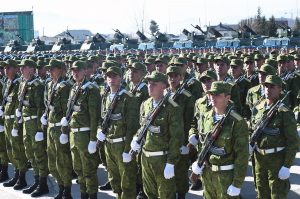When President Shavkat Mirziyoyev came to power, good relations with the neighboring countries was at the center of his foreign policy. He has stayed true to this course and numerous activities on a number of tracks have been taking place in the past four years. One track for cooperation is military collaboration between Uzbekistan and its neighbors; such cooperation was absent prior to Mirziyoyev’s presidency.
On March 11-14, Tajikistan and Uzbekistan conducted their third annual military exercises. The countries have taken turns hosting the exercise and this year Tajikistan hosted the five-day event. An elite company of Uzbek special forces n and three companies of Tajik special forces participated. The exercise scenario involved militants from a neighboring country crossing into Tajikistan, seizing hostages, and government troops responding with air attacks.
Military cooperation between Uzbekistan and Tajikistan was launched following the very first visit of an Uzbek Minister of Defense to Dushanbe in October 2017. The following year in March 2018, three defense related agreements were signed: on transit cooperation of military, special cargo and military contingents through the territories of both parties, on cooperation in the field of civil defense and the prevention and elimination of emergency situations, and on military cooperation between the defense ministries.
In August 2018, the two countries held bilateral meetings between their ministries of emergency, ministries of defense and interior, and state secret services. Later the same month these meetings culminated in the signature of a strategic partnership agreement making Tajikistan Uzbekistan’s third Central Asian strategic partner (the others being Kazakhstan and Turkmenistan, and of those two Uzbekistan’s forces have regularly exercised with Kazakh partners since 2018).
Also in 2018, Tajikistan hosted the first military exercise with Uzbekistan in August, in which the border troops of both counties fought back notional Islamists entering from Afghanistan. Within a month of the first exercise, Tajikistan hosted a larger anti-terrorism exercise in September 2018. One hundred Army officers from Uzbekistan and 500 Army officers from Tajikistan participated.
In 2019, Uzbekistan hosted two anti-terrorism exercises with Tajikistan. The first took place in April with military reconnaissance troops of both countries and in September, between military troops.
Such bilateral military exercises are clearly of high importance to both countries, given that the respective ministers of defense attend. Afghanistan to the south is also a tangible motivating factor for rehearsing responses to insurgencies, terrorists and other emergency situations.
The military exercises between Tajikistan and Uzbekistan have taken place because of the close political relations between the leaders of the two countries; both countries are motivated by the common threat perceived from bordering Afghanistan. Russia frequently warns about danger in the region, for example stating in 2019 that the situation in Central Asia could turn dire as the Afghanistan-Central Asia borders had amassed 5,000 militants. Though such statements from Russia appear frequently, Central Asian governments barely respond to them perhaps from a believe that Moscow simply wants to whip up fear and exaggerates the situation to push them closer to Moscow’s military embrace.
Despite the reality of the Afghan border and the exact number of militants, the situation is far from stable from the perspectives of Turkmenistan, Tajikistan, and Uzbekistan. The Tajikistan-Uzbekistan joint military exercises mean that both countries are united by possible instability in Afghanistan and the risk of so-called spillover into their territories. The joint military exercises are an attempt to take a control, together, of an unstable situation.

































